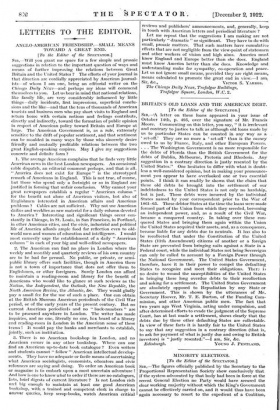BRITAIN'S OLD LOANS AND THE AMERICAN DEBT. [To the Editor
of the SPECTATOR.] Sin,—'A letter on these loans appeared in your issue of October 14th, p. 495, over the signature of Mr. Francis
Moore. Commenting on this letter, you say, "it is irrelevant and contrary to justice to talk as although old loans made by us to particular States can be counted in any way as a 'set-off.' They are no more a ' set-off ' than is the money owed to us by France, Italy, and other European Powers. . . . The Washington Government is no more responsible for the debts of Florida than the British Government for the debts of Dublin, Melbourne, Pretoria and Rhodesia. Any suggestion in a contrary direction is justly resented by the United States." One hesitates to differ with what is doubt- less a well-considered opinion, but in making your pronounce- ment you appear to have overlooked one or two essential points. I think it can readily be shown that the claim that these old debts be brought into the settlement of our indebtedness to the United States is not only no hardship; but is just. These debts were incurred by the individual States named by your correspondent prior to the War of 1861-65. These debtor States at the time the loans were made formed part of the Union from which they seceded, becoming an independent power, and, as a result of the Civil War, became a conquered country. In taking over these con- quered States and bringing them again within the Union the United States acquired their assets, and, as a consequence, became liable for any debts due to neutrals. It has also to be recollected that under the Constitution of the United States (11th Amendment) citizens of another or a foreign State are prevented from bringing suits against a State in a Federal court, while the individual States not being Sovereigns can only be called to account by a Foreign Power through the National Government. The United States Government, therefore, have it in their power to compel the defaulting States to recognize and meet their obligations. Thcnz. i3 no desire to wound the susceptibilities of the United States in bringing these long overdue debts to their recollection and asking for a settlement. The United States Government are absolutely opposed to Repudiation by any State or Government. This is shown by the utterances of Mr. Secretary Hoover, Mr. T. E. Burton, of the Funding Com- mission, and other American public men. The fact that two years ago West Virginia, acting under compulsion, and after determined efforts to evade the judgment of the Supreme Court, has at last made a settlement, shows clearly that the debts due by these other defaulting States are collectable. In view of these facts it is hardly fair to the United States to say that any suggestion in a contrary direction (that is, to ask for payment of what is justly due and owing to British investors) is "justly resented."—I am, Sir, &c.






































































 Previous page
Previous page